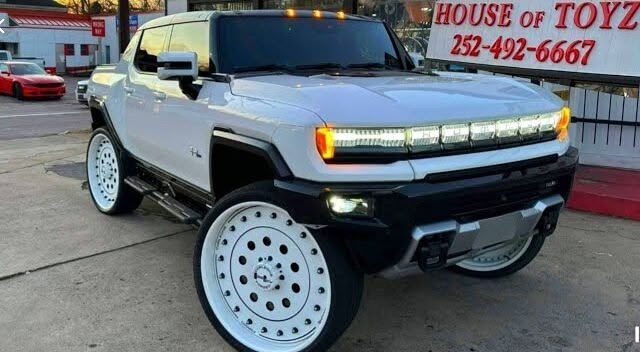GM curtails EV Hummer production, pivots to revival of Chevy Bolt.

Photo above - there are a number of aftermarket parts and accessories for your Hummer EV to make it more distinctive.
Wow . . . who would EVER have guessed this? After 13,994 Hummer EV trucks have been sold, the market is saturated and nobody else wants a $107,445 off road toy which gets worse mileage than an ICE Dodge Ram? GM has immediately halted 2nd and 3rd shift Hummer production, to “allow supply and demand to reach alignment”. (see link below)
I could be wrong about the Ram mileage thing.
The good news is that the Chevy Bolt, killed off in 2024, is coming back for 2027. Wait . . . that’s GOOD news? Isn’t that the car with the spontaneously combusting battery pack that we were told NEVER to park outside? Even after 100% of the vehicles had their batteries replaced for free in a recall? Wow, that must have cost General Motors a LOT of money.
So will the resurrected Bolt be powered by GM’s new proprietary “Ultium” batteries? Wait . .. it won’t? It’s going to arrive with some off-brand, made in China, AA-sized cells? (See link below).
Wow, Trump is NOT going to like this. There could be tariffs on foreign parts like that, except last night one of the 10 courts examining the tariff question contradicted another court, and tariffs are suspended for now. Expect the stock market to soar when it reopens on Tuesday.
I’m very okay with the Bolt arising from the dead. GM did that previously with the Camaro, Impala, Malibu, Suburban, Tahoe, (Trail) Blazer . . . well, you get the idea.
And the world is running out of electrified vehicle names to be copyrighted. GM already owns own Bolt. And volt. And Electra. Can’t touch lightning, electron, anything with “ion” in it. Amp, watt, ohm, and rectifier are still available, although that last one might cause titters.
Maybe it's time to start trademarking foreign words. How about “ Zhenjing”? In addition to its potential association with Zen meditation, Zhenjing means “shocking” in Chinese. The Chevy Zhenjing! It's safe to park indoors, gweilo!
I’m just sayin’ . . .
GM Hits the Brakes on Hummer EV and Escalade IQ Production: TDS
Would You Buy 2027 Chevy Bolt EV With Chinese Battery Pack?






